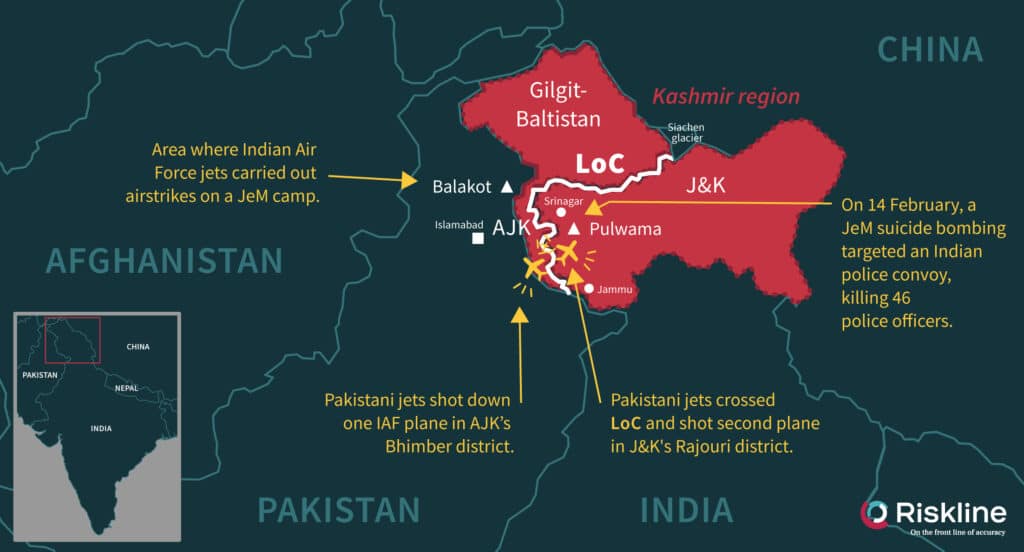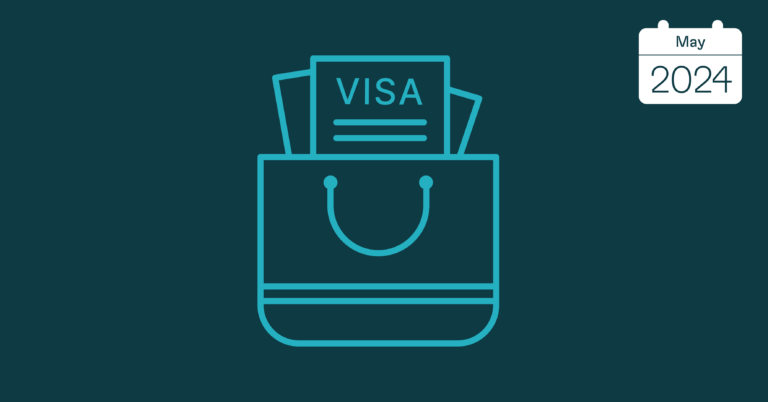Tensions between India and Pakistan escalated after a 14 February suicide bombing by Pakistan-based Jaish-e-Mohammad (JeM) militants killed 46 policemen in Pulwama in Indian-controlled Jammu and Kashmir state (J&K), in the worst terror attack in J&K in three decades. Indian Prime Minister Narendra Modi blamed Pakistan of supporting JeM and on 26 February authorised Indian Air Force (IAF) airstrikes on an alleged JeM camp in Pakistan’s Balakote, Khyber-Pakhtunkhwa (KP) province, which claimed to kill dozens of militants. Pakistan’s Prime Minister Imran Khan denied India’s allegations and subsequently authorised its air force to shoot down two IAF jets, one in J&K and another in Pakistan-controlled Azad Jammu and Kashmir (AJK), capturing one Indian pilot, in retaliation for India’s intrusion in Pakistani airspace. Artillery fire exchanges between Indian and Pakistani soldiers across the Line of Control (LoC) – a military border separating AJK and J&K in the Kashmir region – increased after the airstrikes, where each party blamed the other of ceasefire violations, while the tensions have also triggered disruptive airspace closures over Pakistan and northern India. Although the Pulwama attack has brought the two regional nuclear powers to the brink of war, Modi and Khan are unlikely to allow tensions to escalate to a full-blown conflict in the near-term, considering that such a blowout will bring major losses to their economies.
Diplomatic relations have remained strained between India and Pakistan after they fought three wars in 1947, 1965 and 1999, over their rivalling claims on the Kashmir region. The Kashmir dispute fuelled the rise of pro-Pakistan militants like JeM who seek the unification of J&K’s Kashmir Valley (a Muslim-majority region in Hindu dominated India) with an Islamic-majority Pakistan. JeM cadres move undetected across the LoC as pro-separatists in J&K and AJK provide them refuge, which has India blaming Pakistan of supporting militants. Since late 2016, India has increased artillery strikes across the LoC and the international border targeting militants in AJK, following two deadly JeM attacks on military bases in J&K in September that year. India’s actions prompted retaliatory fire by Pakistan, who viewed India’s incursions in AJK as a violation of a ceasefire deal signed in 2003. Against this backdrop, it was hardly surprising that tensions between India and Pakistan escalated with the Pulwama attack. Following violent anti-Pakistan protests across India on 15-16 February, Modi’s Bharatiya Janata Party-led government felt pressured to retaliate strongly to Pakistan’s alleged support for JeM, also shoring up public support for Modi ahead of the April general elections. Sure enough, the airstrikes triggered praises for Modi across India.
However, India and Pakistan’s airstrikes on each other’s territory were orchestrated such that they caused no civilian casualties or infrastructure damage and were portrayed as self-defense measures. The controlled nature of these airstrikes improved prospects for de-escalating tensions between the two countries in the near-term. Pakistan also released the captured IAF pilot as a peace offering to India. Khan will likely explore all diplomatic avenues with India as Pakistan will find it difficult to finance a war when it has foreign debts of over US$91.8 billion. Khan’s priorities lie in reducing Pakistan’s debts and maintaining the steady flow of investments from China, US, UK, Hong Kong and Switzerland in the country’s infrastructure development projects. Modi is also unlikely to authorise further airstrikes to goad Pakistan into a war which risks ruining his political image ahead of the general elections, as a war will cause substantial losses for India’s economy. A war would also ruin Modi’s reputation in the international community as a leader focussed on helping India maintain strong economic growth (which grew from 6.7 percent in 2017 to 7.3 percent in 2018) to emerge as a superpower in the future.
While avoiding a war is in the best interests of both nations, cross-border clashes along the LoC are likely to continue, with a possible spillover of clashes in areas along the international border as India plans to conduct further artillery strikes on suspected JeM hideouts in AJK fearing that the JeM may be planning new attacks in India. But Pakistan denies the existence of militant hideouts in AJK and will retaliate with artillery fire against India’s perceived incursion into its territory. Ultimately, Pakistan and India will have to establish a peace process to try to resolve their border disputes. While such a process can help India enlist Pakistan’s help to tackle militancy in the Kashmir region, it will also limit India’s space to launch arbitrary raids in AJK, much to Pakistan’s relief.
Ramya Dilipkumar is an Australia-based political and security risk analyst covering South Asia.















